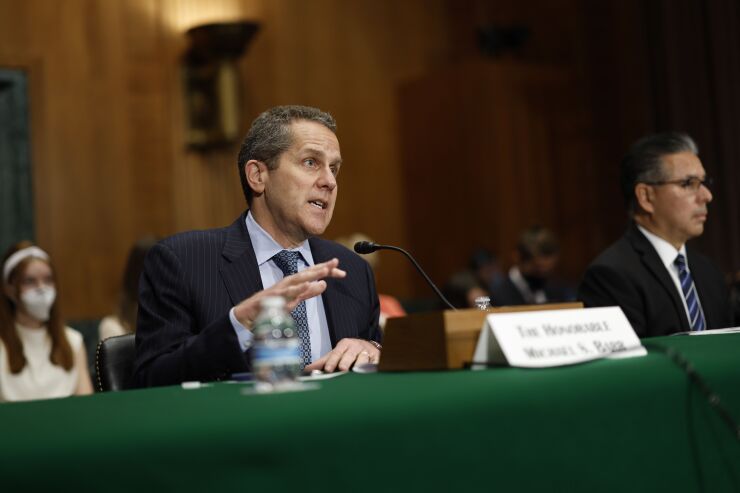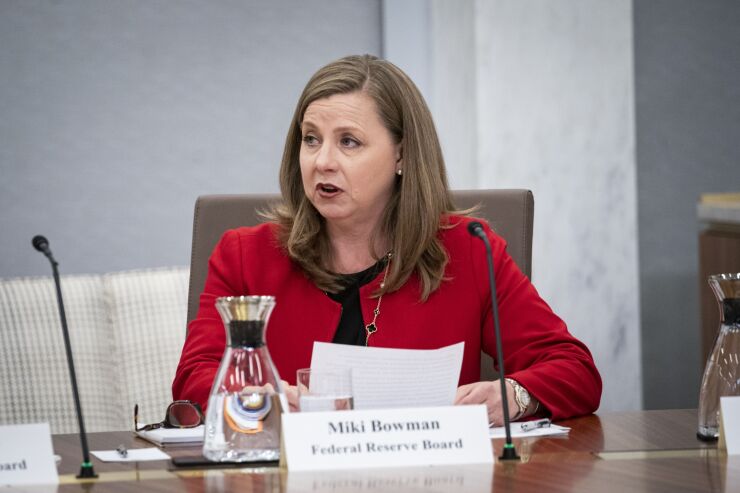The Federal Reserve's top regulator indicated that higher bank capital requirements and a revamped stress test regime could be in the works.
Fed Vice Chair for Supervision Michael Barr, in a speech delivered at an American Enterprise Institute event Thursday afternoon, detailed the objectives of his "holistic" review of the central bank's capital framework.
Barr took no firm stance on how the Fed's various standards might change, but he said the current calibration appears to be insufficient.

"There is a body of empirical and theoretical research on optimal capital, which attempts to determine the level of capital that equalizes the marginal benefits of capital with the marginal costs," Barr said. "While the estimates vary widely, and are highly contingent on the assumptions made, the current U.S. requirements are toward the low end of the range described in most of the research literature."
Since his initial confirmation hearing in front of the
Barr said Thursday that such reviews should be done periodically to ensure bank oversight keeps pace with industry advancements and is positioned to meet future challenges.
Throughout his prepared remarks, Barr emphasized that he would approach the review with an open mind and not to base conclusions on preconceived notions.
"We are approaching the task with humility," he said, "not the illusion that there is an immutable capital framework to be discovered, but rather, with the awareness that revisions we conceive of today will reflect our current understanding and will inevitably require updating as our understanding evolves."

Still, Barr made the argument that strong capital requirements support banks. He also said the regulatory framework created by the Dodd-Frank Act — which he helped implement as assistant secretary of the Treasury for financial institutions during the Obama administration — helped the U.S. economy grow.
He also pushed back against some of the arguments made by banks and their advocates in favor of less stringent capital rules. Specifically, he rejected the narrative that bank resilience during the COVID-19 pandemic proves that capital standards are already sufficiently high.
Barr said the rapid response by the president and Congress to bolster the economy with fiscal support and the Fed's monetary intervention all meant the capital requirements were never actually put to the test.
"Furthermore, I'd observe that the recent experience of the pandemic suggests that large, unexpected shocks can occur with little notice," he said. "Our inability to predict such events would argue for a higher overall capital level than one based solely on historical experience."
During a question and answer session following his speech, Barr went further to say that it would be irresponsible to have a regulatory system that relied on banks being bailed out by taxpayers in instances of extreme economic distress.
"We really want to think about capital as having the banks, in this case, internalize the costs that might happen if they were to get into trouble, and that would not include planning on having government support, whether directly or indirectly, to the bank," he said. "It's quite important that we not assume the taxpayer steps in, that we assume rather the opposite, that banks are able to stand on their own bottom and … continue to support the economy."
While all facets of bank regulation are on the table during the current review, Barr flagged stress tests as one area that could see significant changes. He argued against having "static" tests that evaluate banks on similar scenarios year after year, but rather adjusting them to test against a wider variety of disruptions.
"Stress tests are not meant to be predictions about the future. Humility suggests caution in that regard, but they should be stressful," Barr said. "Poking and prodding at the system so we can attempt to uncover hidden risks that could become manifest under certain scenarios. This is particularly important in today's complex and interconnected financial system, in which problems can spread and lead to unexpected losses."
Barr did not provide a timeline for the completion of the review, but noted that he hoped to have a significant update early in the new year.
During the speech — his third since being installed as the Fed's chief regulatory official in July — Barr highlighted the financial stability risks presented by unregulated nonbanks.
"We need to worry, a lot, about nonbank risks to financial stability," Barr said, "During the global financial crisis, many nonbank financial firms had woefully inadequate capital and liquidity, engaged in high-risk activities, and were faced with devastating runs that crushed the financial system and caused enormous harm to households and businesses."
Insurance companies, government-sponsored enterprises, money market funds, hedge funds and other investment vehicles present a similar — if not greater — risk to today's economy, Barr said. Nonbank financial institutions account for 60% of credit in the U.S. economy, he said, up from 30% in 1980.
Barr acknowledged that stiffer capital standards for banks have fueled the growth of nonbanks, which often have little to no capital requirements, but said that should not be used to justify softening bank capital rules.

"We should monitor the migration of activities from banks to the nonbank sector carefully, but we shouldn't lower bank capital requirements in a race to the bottom," he said. "In times of stress, banks serve as central sources of strength to the economy, and they need capital to do so."
This stance seems to contradict a policy argument made by another Fed Board member just hours before. During an
"In my mind, it's important that we work to specifically further the ability for banks to participate in those traditional activities that they have been very successful in providing services in and not unintentionally or intentionally push those services outside the regulated banking sector," Bowman said.
During the question and answer portion of the AEI event, Barr elaborated on his views, saying he favors applying more regulation to nonbanks to minimize risks. He said this could be done, in some instances, under provisions of Dodd-Frank that allow for entities to be deemed financial market utilities or nonbank systemically important financial institutions to bring them within the regulatory perimeter.
In this regard, Barr and Bowman seem to be more in alignment. On Thursday, Bowman said she supported applying stricter regulations to banklike activities occurring outside the banking sector. "If it's the same product, the same risk, we have to have the same regulation," she said.





